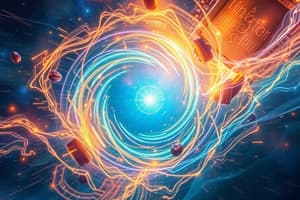Podcast
Questions and Answers
The study of effect produced by heat is called ______.
The study of effect produced by heat is called ______.
thermodynamics
She discovered elements such as ______ and polonium.
She discovered elements such as ______ and polonium.
radium
He made significant contributions to the development of ______ mechanics.
He made significant contributions to the development of ______ mechanics.
quantum
The Law of ______ describes an object's tendency to resist changes in motion.
The Law of ______ describes an object's tendency to resist changes in motion.
To round 241 to the nearest 10, the answer is ______.
To round 241 to the nearest 10, the answer is ______.
All nonzero digits are ______.
All nonzero digits are ______.
The value 211.8 has ______ significant figures.
The value 211.8 has ______ significant figures.
Rounding 6.123 to the nearest whole number results in ______.
Rounding 6.123 to the nearest whole number results in ______.
Study Notes
Opening Prayer
- Invokes God for inspiration and support in actions and knowledge.
- Emphasizes the desire for knowledge to originate from God and culminate in wisdom.
- Requests understanding, truth, and peace to be instilled in participants.
- Encourages striving to understand and fulfill God's will.
Learning Checks
- Study of effects produced by heat is termed Thermodynamics.
- Noteworthy contributions to chemistry include the discovery of radium and polonium by Marie Curie.
- Significant advancements in quantum mechanics attributed to Erwin Schrödinger.
Laws of Motion
- First Law (Law of Inertia): An object remains at rest or in uniform motion unless acted upon by a net force.
- Second Law (Law of Acceleration): The acceleration of an object is dependent on the net force acting upon it and its mass.
- Third Law (Law of Interaction): For every action, there is an equal and opposite reaction.
Exercise: Rounding Off
- Examples of rounding numbers to the nearest specified values given.
- Rounding rules apply for both single and multi-digit numbers.
- Nonzero digits in any number signify significant figures, e.g., 211.8 has four significant figures.
Studying That Suits You
Use AI to generate personalized quizzes and flashcards to suit your learning preferences.
Related Documents
Description
Test your knowledge on key scientific concepts including thermodynamics, the laws of motion, and significant contributions to chemistry. This quiz covers essential principles and discoveries, encouraging a deep understanding of the physical sciences. Perfect for students looking to strengthen their knowledge in these areas.




